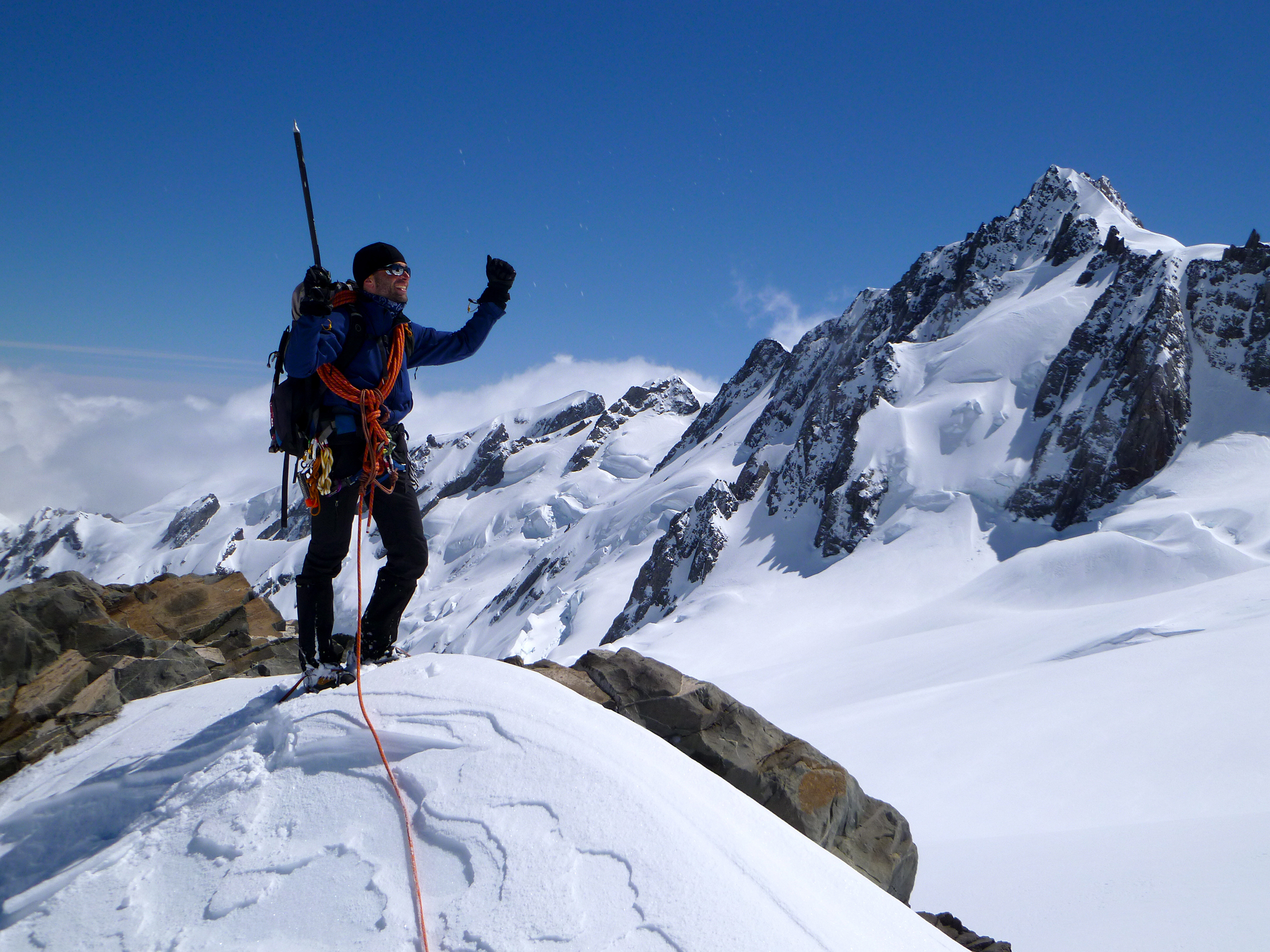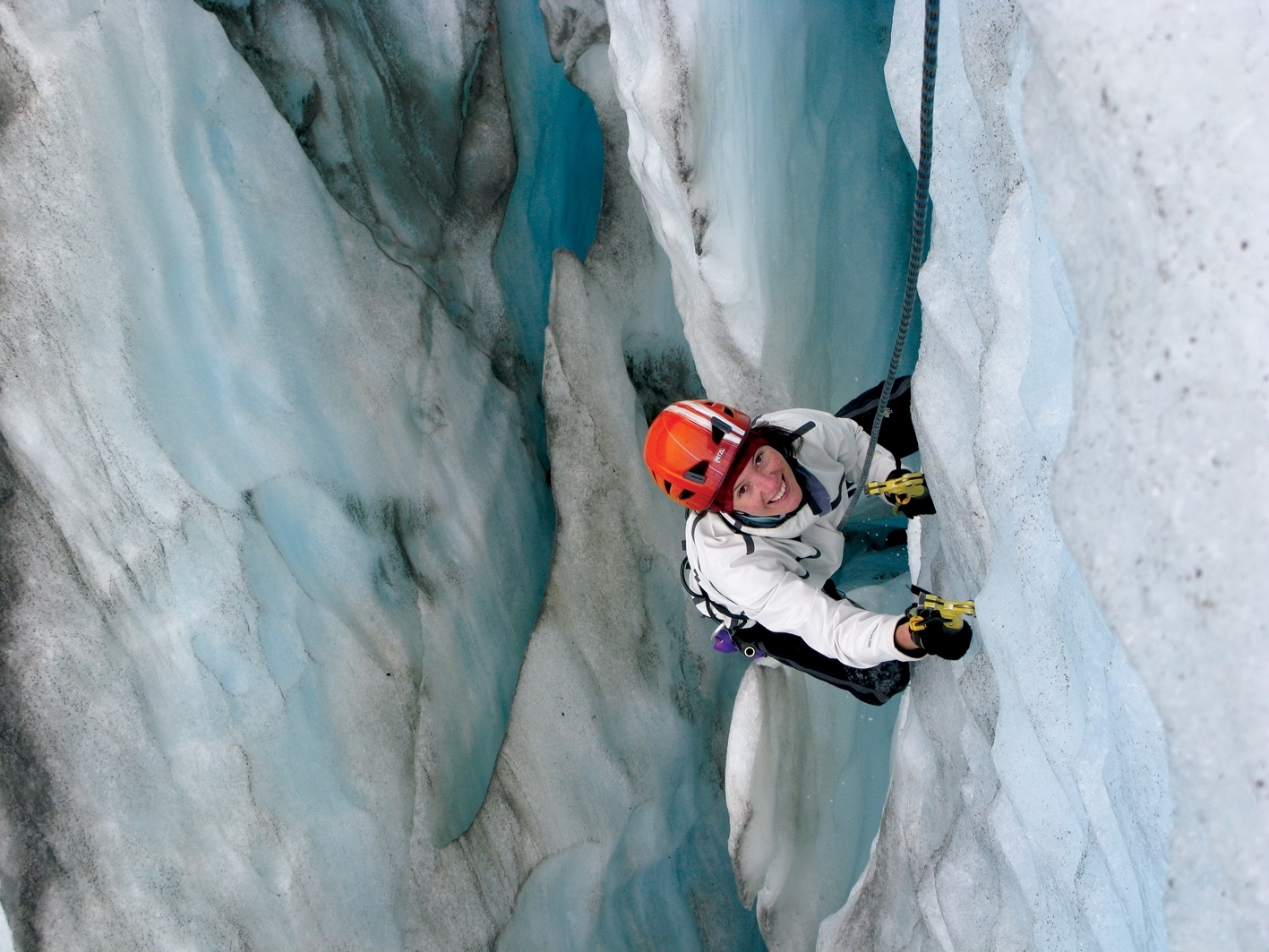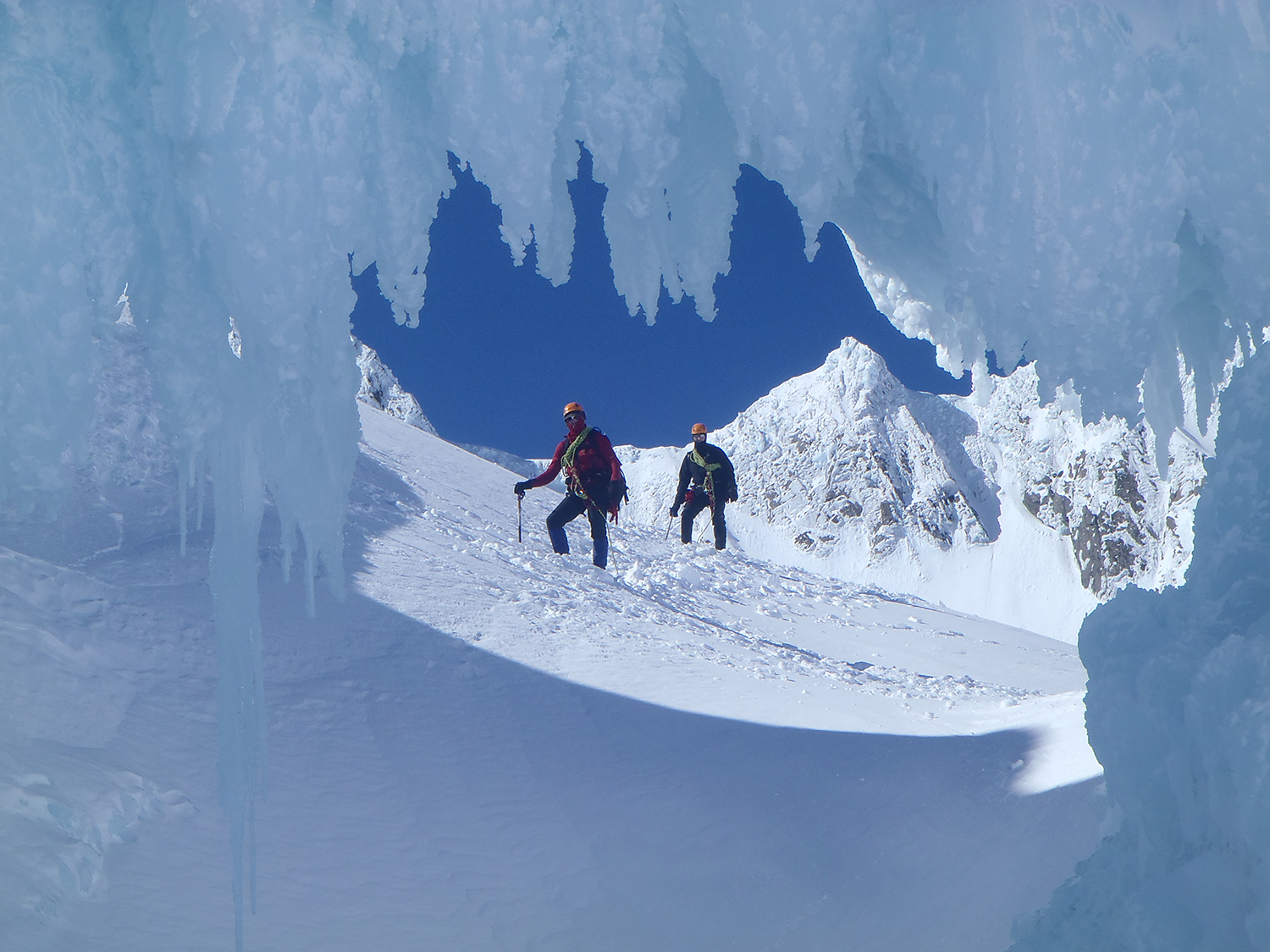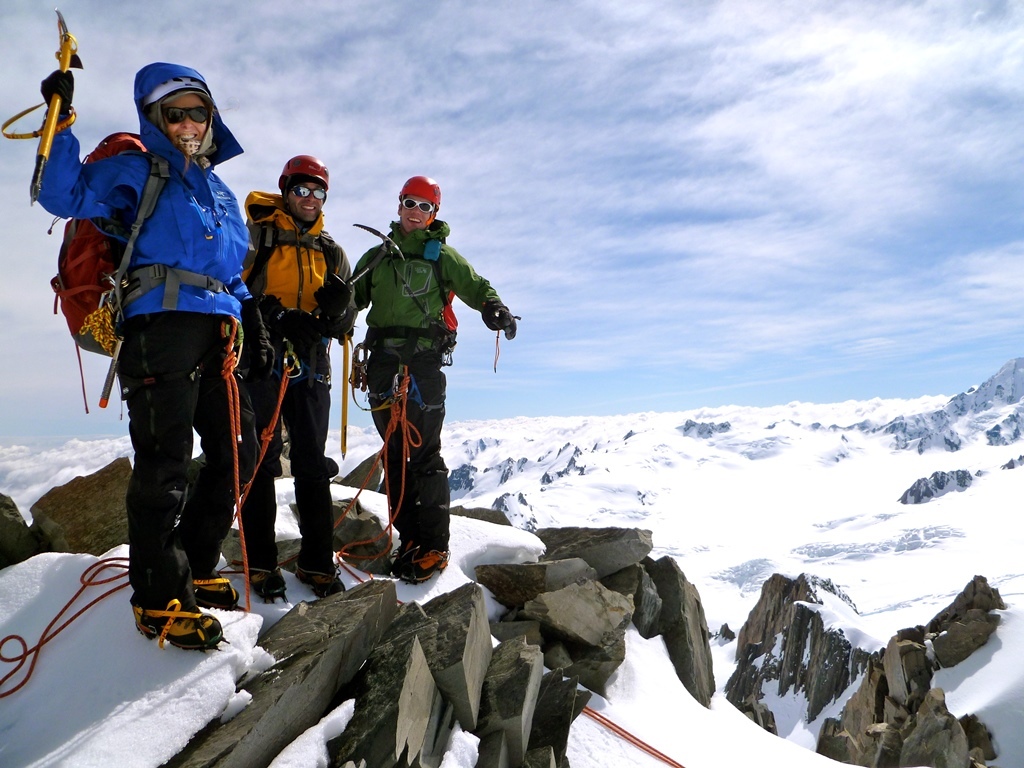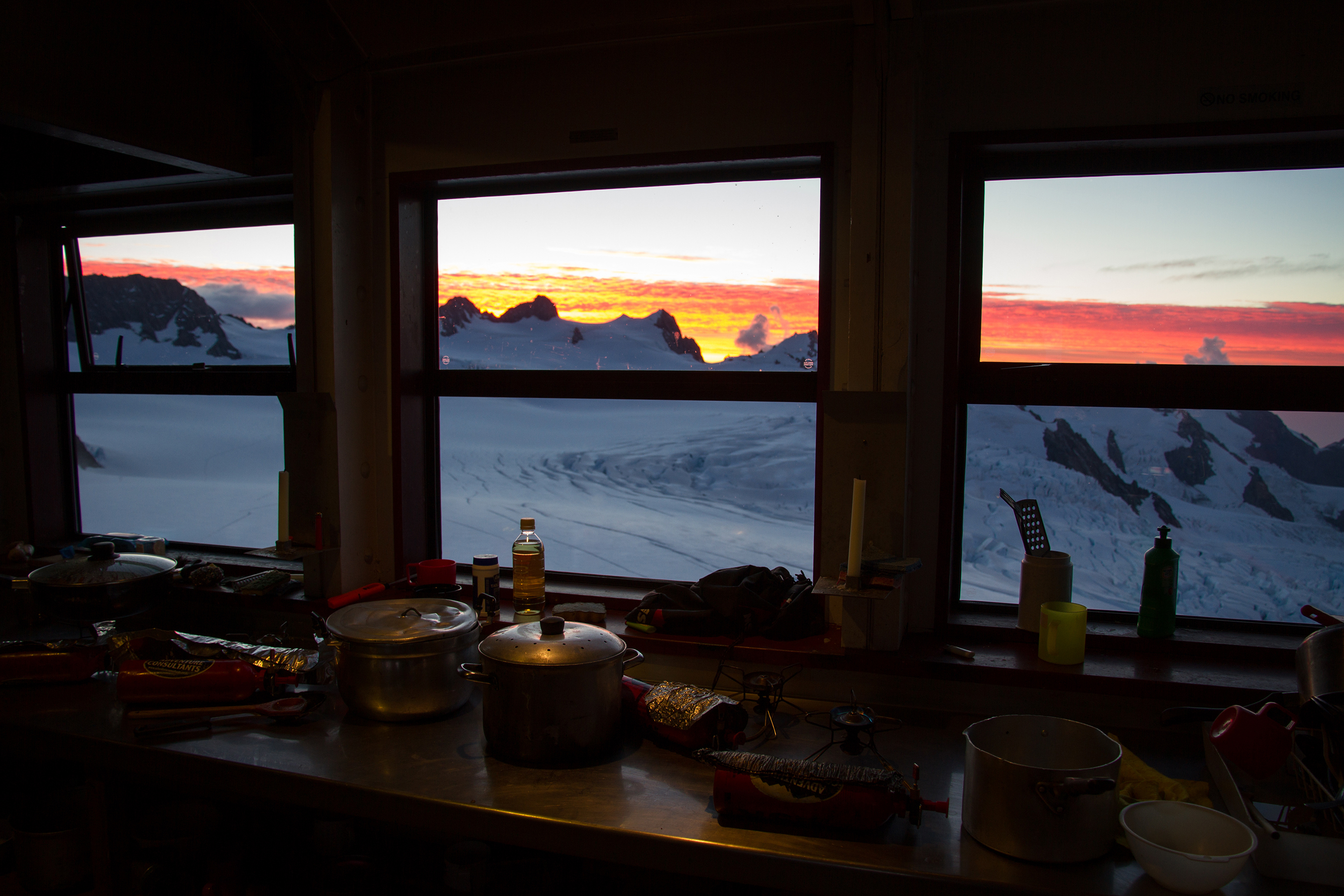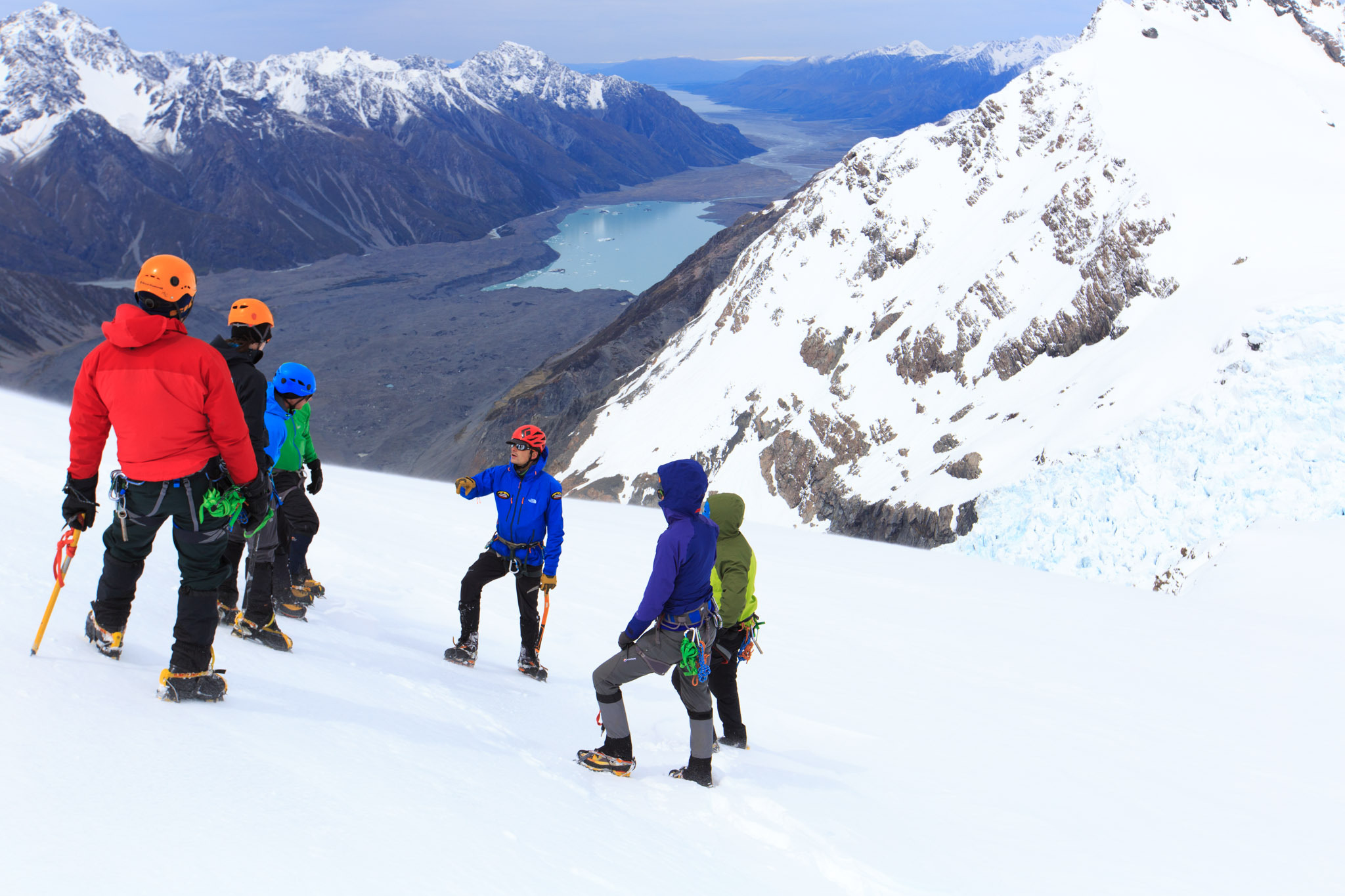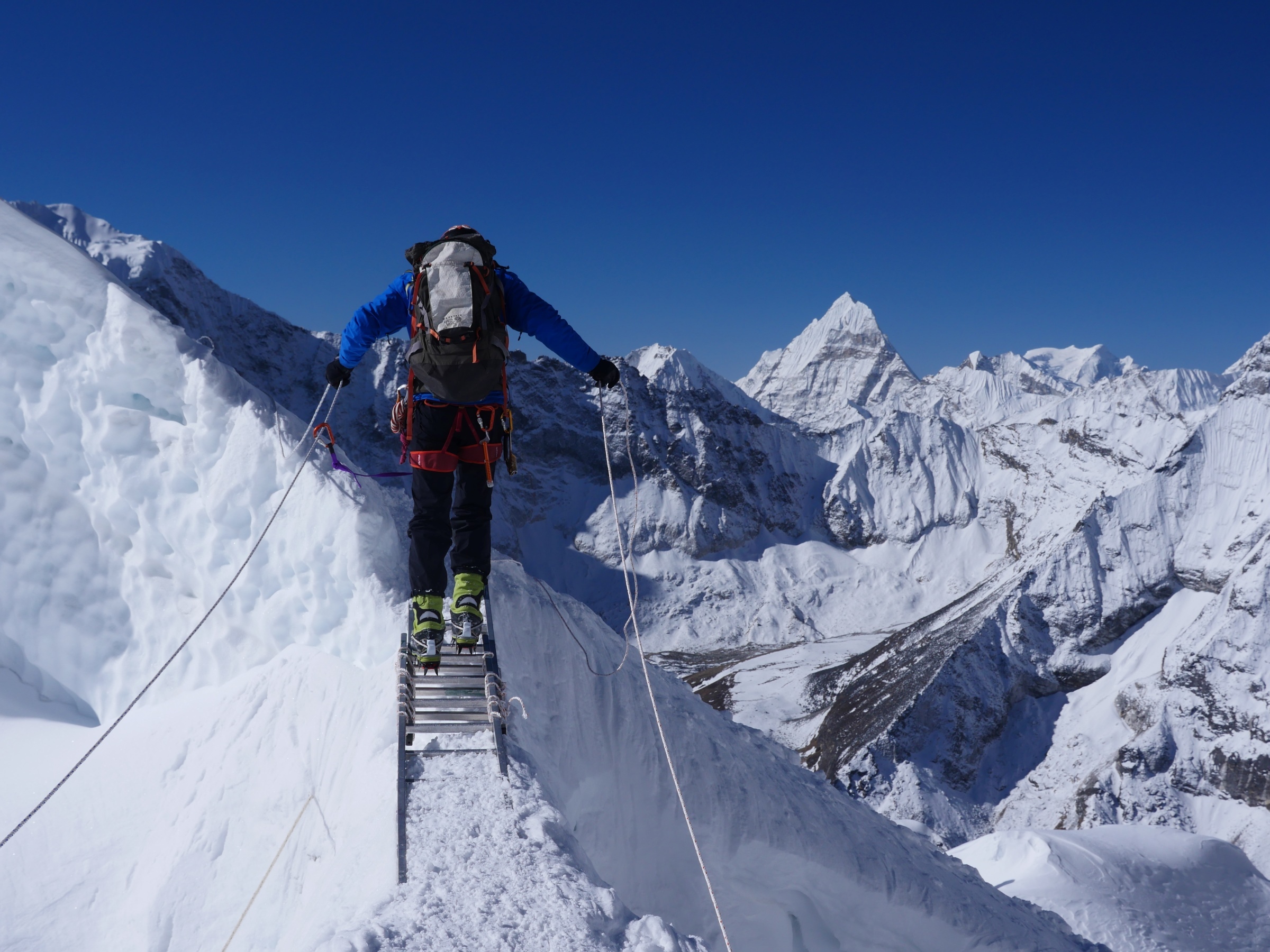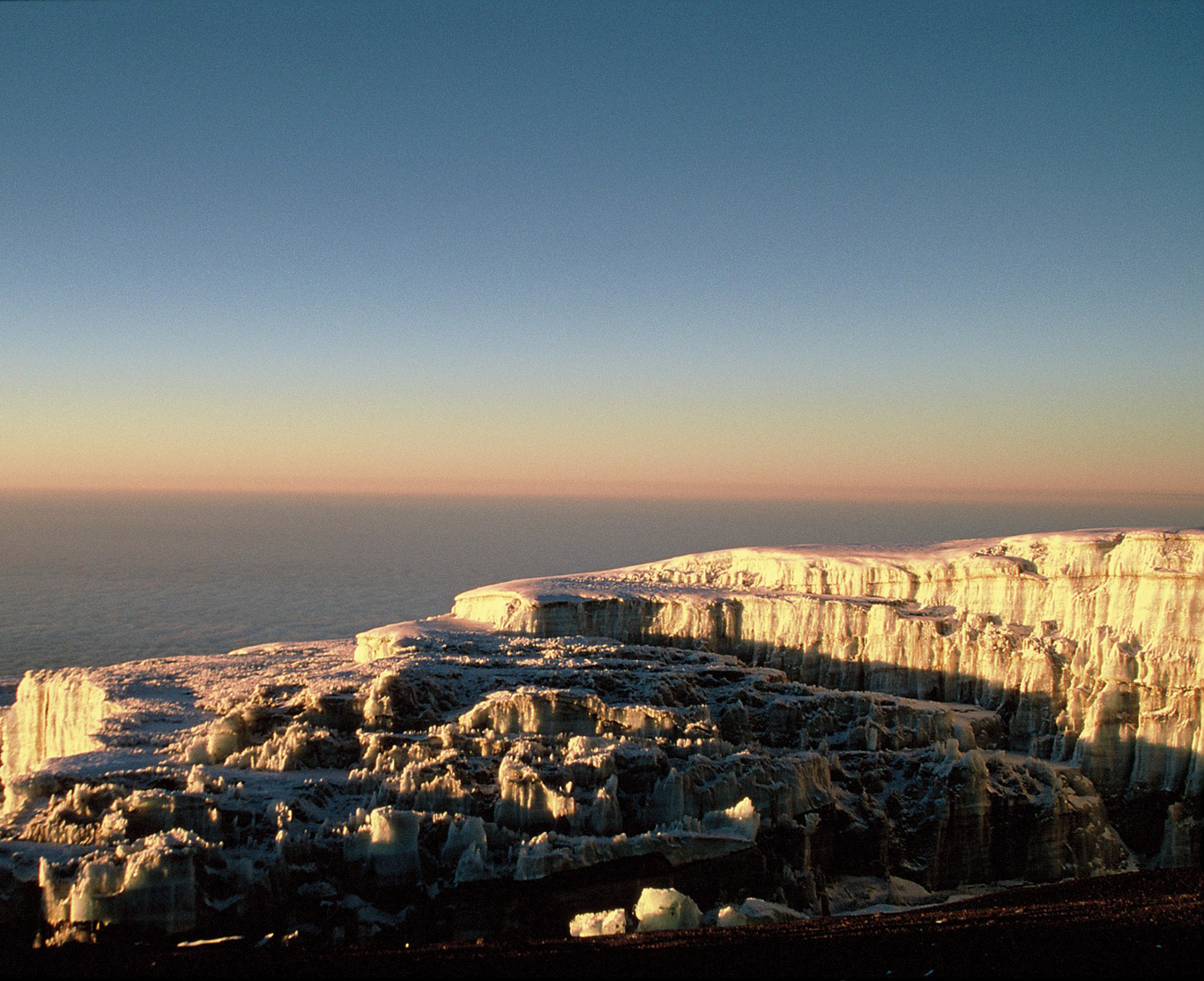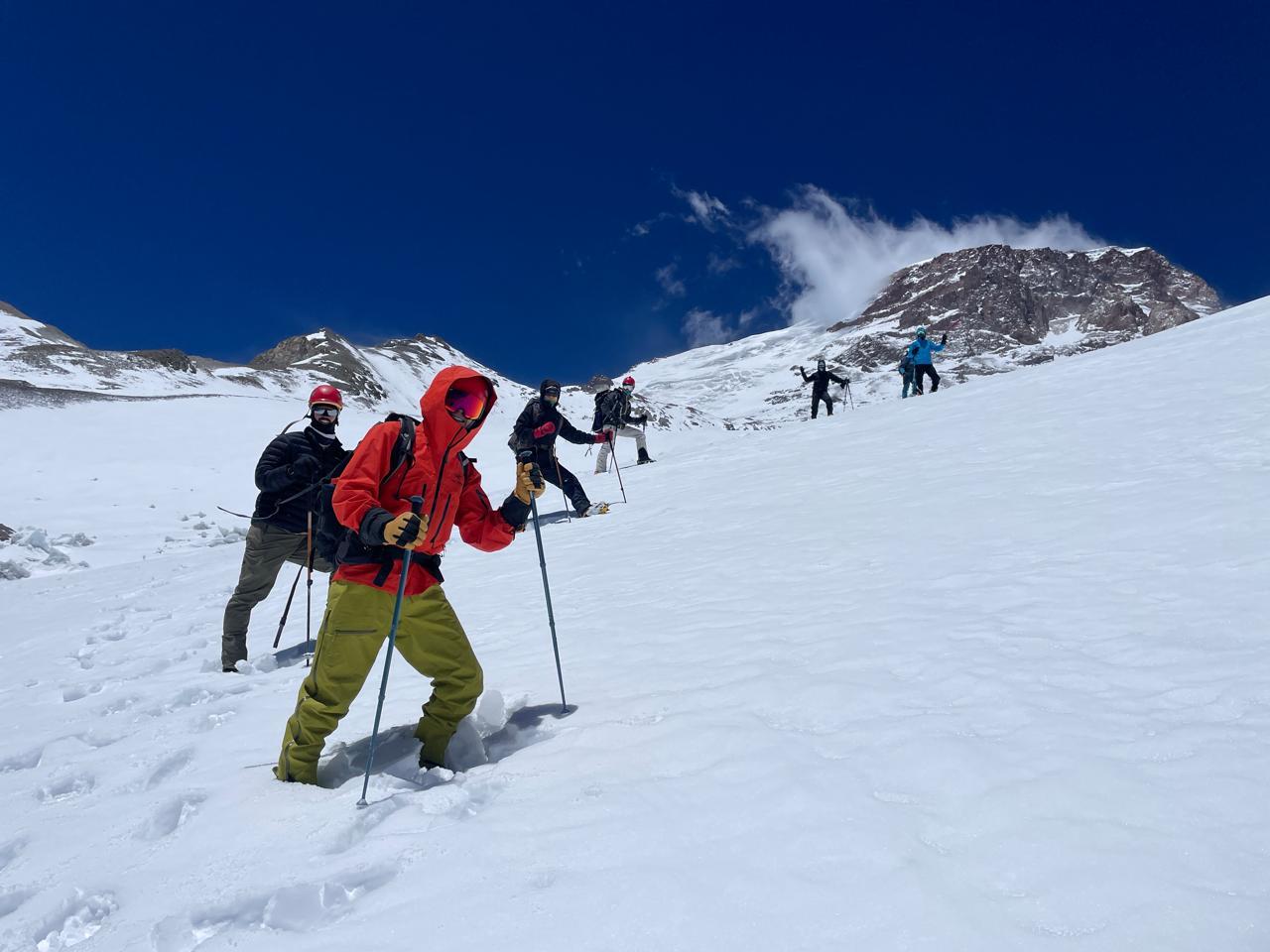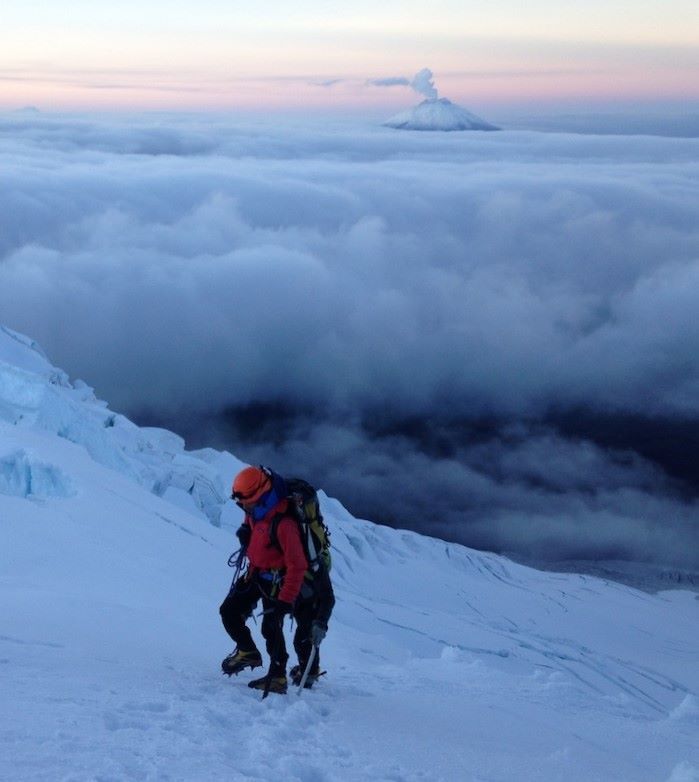A high level of aerobic fitness is required for this course. You must be able to carry an 8 kg backpack 1,000 vertical metres in 3.5 hours.
The TMC is THE advanced mountaineering course. Join us to develop and fine-tune your technical climbing skills. We focus on the most current techniques to enable you to explore any mountain range on Earth.
At 8 days the course allows for a complete immersion in the mountains and time to experience and adapt to changing weather and mountain conditions. In addition to learning new skills, we aim to climb 2 or 3 summits.
You will climb with coaching and guidance from a professional mountain guide. A maximum of 4 climbers per guide allows for challenging ascents with personalised instruction. Rather than following explicit instructions, your guide will coach you as you climb peaks and routes in glaciated terrain. You will gain experience and confidence on snow, ice, and rock.
We focus on encouraging problem-solving, advanced technical rope skills, and strategies for independent climbing. The low guide-to-guest ratio ensures you have close attention and opportunities to lead, with supervision.
Your time in the mountains is valuable, that’s why the focus of our TMC is to learn while climbing. Possibilities for climbs and summits may include Mt Green, Mt Hamilton, The Minarets, Lendenfeld Peak, Mt Abel, Elie De Beaumont, and others.
Climbing Ability
Climbing Ability
Intermediate
Elevation
Elevation
2,000m/6,650ft
Duration
Duration
8 days
Location
Location
Aoraki Mount Cook, NZ
On the first morning you will meet the team and work with your guide to make a plan - looking at weather, conditions, and goals. Check and pack food and equipment. Rental equipment will be issued, as required.
We will try to fly into the mountains early on the first afternoon. Expect to be in the mountains for up to 8 nights of the course. When you arrive in the mountains, you will probably need to rope up for glacier travel and haul your gear and food to the hut. Your guide will introduce you to your mountain abode and provide a refresher on hut etiquette and management.
Your first 2 days will typically focus on reviewing and solidifying core mountaineering skills; movement, crampon, self-arrest, anchor theory, and familiarisation with the area.
The focus of the TMC is to 'learn by doing'. We will work to best use the weather and conditions to get out climbing. Any weather days will be used to cover theory topics such as weather, avalanche, navigation, and rope skills.
Each day will have an objective that best suits the conditions, weather, and learning pathways of the group. Course participants will take part in planning and preparation for the day's objective. The guide will assist in the role of mentor and safety/technical advisor. The guide may also take an active leadership role, as required.
As you progress the focus will shift to more complex terrain and refining rope and anchor skills.
Ice climbing on glacial seracs and crevasse rescue are excellent opportunities to fine-tune your skills and receive feedback on technique from your guide. We aim to spend at least half a day on each of these training activities.
As an advanced course, there will be variations in the content which is covered. Conditions and the specific skills of participants will shape the program. We work hard to ensure that participants have the required skills and experience and we focus on making sure that everyone has a good understanding of the topics which are covered.
Your days will begin at around 07:00. Some of your climbing days may require an 'alpine start' - as early as 03:00. In this case, you will finish the day earlier. Expect to be out for 8 to 10 hours most days.
We aim to be back in Aoraki Mount Cook Village on day 7 for a revision of course topics, return gear and debrief - with the potential for a visit to the local crag if time allows.

Departures and Pricing
| Start/End | Departing from | Quantity | Pricing | Notes | Book |
|---|
Training for a high-altitude objective? Check out our Expedition Training Course
PREPARE
Previous experience in mountaineering in glaciated terrain is essential. This should at least be similar to the level of completion of the Alpine Skills Course (ASC).
- Additional mileage in the mountains is preferred.
- A background in rock climbing is required.
Some skills will be revised early in the course, but it is important that you have the prerequisite experience and a high level of aerobic fitness.
Prior to this course, you should be able to:
- Rope-up for glacier travel
- Demonstrate self-rescue from a crevasse
- Climb sustained 40º to 50º ice or mixed terrain using two tools
- Build simple anchors on rock, snow, and ice, and belay a partner
- Abseil with confidence
- Confidently second on multi-pitch rock, to at least AU grade 15
- Move with crampons and ice-axe over a variety of terrain
- Be willing to adapt and progress in a team environment
- Revision of key mountaineering skills
- Fine-tune glacier travel and crevasse rescue systems
- Snow, ice, and rock climbing, single and multi-pitch
- Anchor building and rope work in the alpine
- Navigation, route finding, and decision making
- Emergency shelters
- Weather and avalanche forecasting
- Trip planning and training ideas
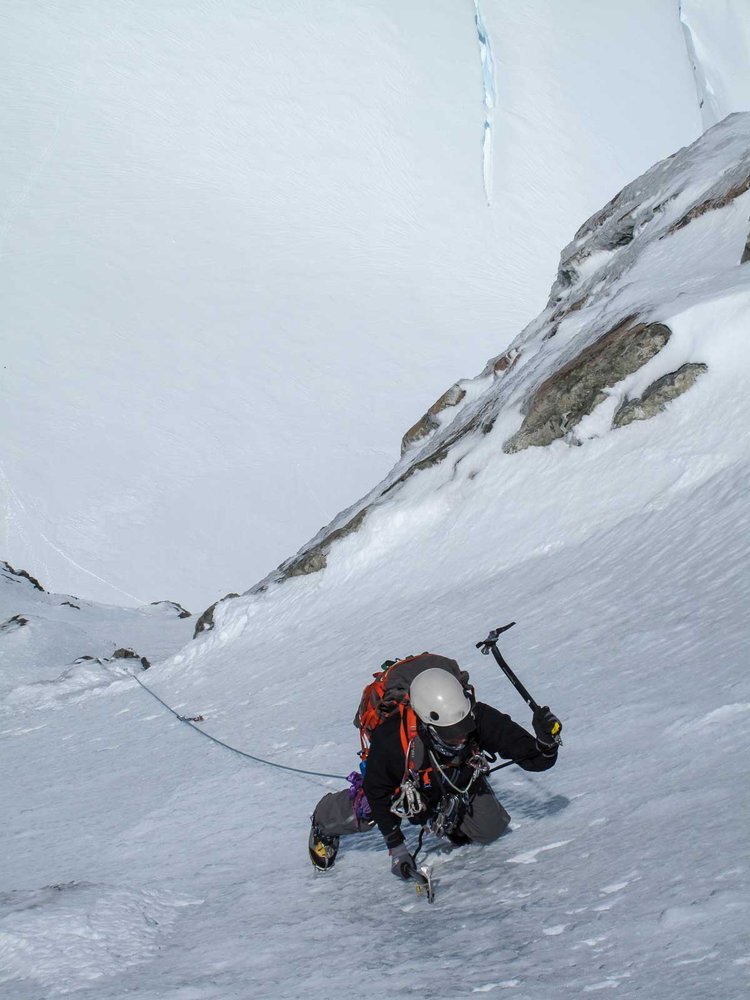
The Adventure Consultants story evolved from the Southern Alps of New Zealand where large glaciated mountains forged our passion for high places. It is a legacy that still exists today through guided ascents and instruction programs. We work with the best guides in the country to bring you high-quality programs that introduce you to the best the country has to offer and we regularly partner with Alpine Guides (Aoraki) to provide professional guiding under the IFMGA qualification program.

The price of your trip includes the following:
- Professional NZMGA/IFMGA mountain guides
- All meals including snacks and energy bars
- Helicopter access and egress from the mountains
- Mountain Hut fees
- Accommodation in Mount Cook Village (as required)
- Free use of a range of technical equipment
- Technical Manual
Just how fit is 'fit enough'? Mountaineering is a demanding activity. The fitter you are the more you will enjoy your time with us. Unless you regularly climb, bushwalk/hike, and are used to long days carrying a pack, you will need to train for mountaineering.
Mountaineering is primarily an aerobic activity
Strength is important for lifting a pack, but it is more important to build up your aerobic fitness level and stamina for long climbing days. Aerobic fitness can only be improved over months - so start your training program now.
As you come close to the time for your climbing trip try to use a few weekends to load up with a 7-10 kg pack and walk all day (8 hours), up hills, if possible, to work on endurance.
Don’t underestimate how rigorous mountaineering can be. It is better to be over-prepared.
See our Fitness Training page for training tips and programs.
The summer climbing period extends from November to early-April. You must be prepared for a wide range of conditions, from very warm, to cold snowy days. As the summer season advances access on to climbing routes will change.
Summer Temperatures and Daylight Hours
- Actual air temperatures may be 8°C, but can feel like 28°C due to reflected radiation.
- Coolest period: November to mid-December, and March-April. Range -10°C to +10°C
- Warmest period: January and February. Range -5°C to +15°C
- Daylight hours: 05:00 to 21:00, with shorter days later in the season.
Changing Snow Conditions
During November and December access on to routes is usually easier, due to fewer crevasses. Expect fresh snow during storms. Your guide will place greater emphasis on avalanche awareness. Avalanche transceivers are normally carried.
The snowpack is deeper and "wetter". Conditions can be soft underfoot early in the season, especially in the afternoon.
From January onwards the snowpack will consolidate (shallower foot penetration). Crevasses are larger. Crevasse bridging is weakest. Less chance of snowfall. Rock fall hazard increases.
Late Season - March onwards: Conditions are typically "hard" underfoot. Crevassing is at its greatest extent. Night temperatures are dropping. Greater chance of snowfall.
For international visitors, Christchurch or Queenstown are the main entry points to the South Island, with the most public transport options. Christchurch has more direct flights.
Intercity Coaches
Intercity Coaches provide direct daily services routes to Aoraki Mount Cook to and from Queenstown and Christchurch. Visit the Intercity website here. We recommend buying a FlexiPass to make considerable savings on your bus fare.
Cheeky Kiwi Travel
Get a shuttle directly to Mount Cook with Cheeky Kiwi Travel. They operate out of Christchurch and Queenstown.
If you have a mountaineering trip booked with us and are unable to coordinate transport from Twizel, please check in with us. We can help arrange transport from Twizel to Mt Cook.
In the remote mountains of New Zealand, there are no cable cars or roads to high elevations to provide easy access to the mountains. Walking into many mountain venues can use up to 2 days of your trip, across very rugged terrain.
To make the best use of your time many of our trips use aircraft access. When you arrive the scale, and nature of the terrain, will make the logic for flying obvious.
Flying access and egress is included in the cost of the Technical Mountaineering Course.
Walking out from your mountain venue is possible, but flying out is by far the more popular choice. Walking out may be beyond your fitness, especially at the end of a long trip. Conditions and weather may dictate that a flight out is the safer choice. Your guide will discuss these options with you.
Once you have made your booking we strongly advise buying travel insurance, to cover you for unexpected cancellations, or other misadventures on your travels. Travel insurance cancellation policies will protect you from losing the deposit for your trip if you have to cancel unexpectedly.
Insurance specifically for mountaineering activities is optional. New Zealand's Accident Compensation Corporation (ACC) system extends to all visitors to New Zealand and includes cover in the event of an accident.
Any travel agent, or insurance broker (even your credit card provider) can assist with standard insurance, including insurance for trip cancellation.
The New Zealand Alpine Club can provide insurance coverage for their New Zealand and Australian members visiting NZ.
